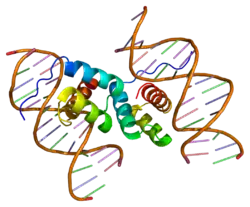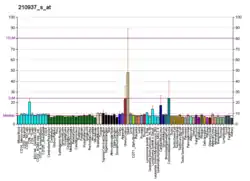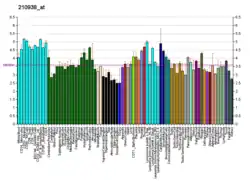| PDX1
|
|---|
 |
| Identificadores
|
|---|
| Alias
| PDX1, GSF, IDX-1, IPF1, IUF1, MODY4, PAGEN1, PDX-1, STF-1, pancreatic and duodenal homeobox 1 |
|---|
| IDs externos |
OMIM: 600733 MGI: 102851 HomoloGene: 175 GeneCards: PDX1
|
|---|
|
|
| Enfermedades genéticamente relacionadas |
|---|
| agenesia pancreática parcial, maturity-onset diabetes of the young type 9[1] |
| Ontología génica |
|---|
| Función molecular |
• DNA binding
• sequence-specific DNA binding
• GO:0001131, GO:0001151, GO:0001130, GO:0001204 DNA-binding transcription factor activity
• chromatin binding
• GO:0000980 RNA polymerase II cis-regulatory region sequence-specific DNA binding
• GO:0001200, GO:0001133, GO:0001201 DNA-binding transcription factor activity, RNA polymerase II-specific
• transcription factor binding
• GO:0032403 protein-containing complex binding
• protein heterodimerization activity
• promoter-specific chromatin binding
|
|---|
| Componente celular |
• citoplasma
• citosol
• nuclear speck
• intracelular
• núcleo celular
• Nucleoplasma
|
|---|
| Proceso biológico |
• exocrine pancreas development
• negative regulation of endoplasmic reticulum stress-induced intrinsic apoptotic signaling pathway
• diferenciación celular
• GO:0009373 regulation of transcription, DNA-templated
• glucose homeostasis
• GO:0044324, GO:0003256, GO:1901213, GO:0046019, GO:0046020, GO:1900094, GO:0061216, GO:0060994, GO:1902064, GO:0003258, GO:0072212 regulation of transcription by RNA polymerase II
• insulin secretion
• GO:1901227 negative regulation of transcription by RNA polymerase II
• generation of precursor metabolites and energy
• transcription, DNA-templated
• desarrollo de organismo multicelular
• GO:0060469, GO:0009371 positive regulation of transcription, DNA-templated
• regulation of cell population proliferation
• positive regulation of cell population proliferation
• nitric oxide mediated signal transduction
• glucose metabolic process
• morfogénesis de órgano animal
• pancreas
• desarrollo del hígado
• positive regulation of insulin secretion involved in cellular response to glucose stimulus
• morphogenesis of embryonic epithelium
• digestive tract development
• negative regulation of type B pancreatic cell apoptotic process
• negative regulation of cell population proliferation
• GO:0003257, GO:0010735, GO:1901228, GO:1900622, GO:1904488 positive regulation of transcription by RNA polymerase II
• endocrine pancreas development
• type B pancreatic cell differentiation
• transcription by RNA polymerase II
• detection of glucose
• smoothened signaling pathway
• desarrollo del sistema nervioso central
• response to wounding
• response to glucose
• response to iron(II) ion
• response to chlorate
• regulación de la expresión génica
• positive regulation of cell death
• GO:1904578 response to organic cyclic compound
• regeneración de órgano animal
• response to nutrient levels
• positive regulation of insulin secretion
• response to vitamin
• response to lipid
• response to cytokine
• response to nicotine
• response to leucine
• response to alkaloid
• positive regulation of DNA binding
• GO:0045996 negative regulation of transcription, DNA-templated
• stem cell differentiation
• response to glucocorticoid
• transdiferenciación
• response to fatty acid
|
|---|
| Fuentes: Amigo / QuickGO | |
| Patrón de la expressión del ARN |
|---|

 |
| Más referencias a datos de expressión
|
| Ortólogos |
|---|
| Especies |
Humano |
Ratón |
|---|
| Entrez |
|
|
|---|
| Ensembl |
|
|
|---|
| UniProt |
|
|
|---|
| SeqRef (ARNm) |
| |
|---|
| SeqRef (proteina) |
| |
|---|
| Localización (UCSC) |
n/a
| n/a
|
|---|
| Búsqueda en PubMed |
[2]
| [3] |
|---|
| Wikidata |
| Ver/Editar Humano | Ver/Editar Ratón |
PDX1 es un gen que tiene un rol determinante regulador durante la formación del páncreas embrionario. La mutación de este gen suele producir importantes alteraciones en la formación del páncreas embrionario, las cuales pueden desencadenar serios desequilibrios en la función del páncreas post-natal.[4]
Su alteración suele acarrear problemas en la diferenciación de las células del páncreas exocrino y en la función de las células beta del páncreas endocrino. La mutación en el SNPs Rs9581943 es muy común en pacientes que sufren cáncer de páncreas, según un análisis del genoma publicado en Nature.[4]
Referencias


